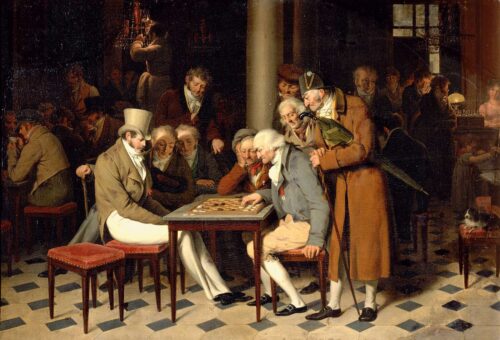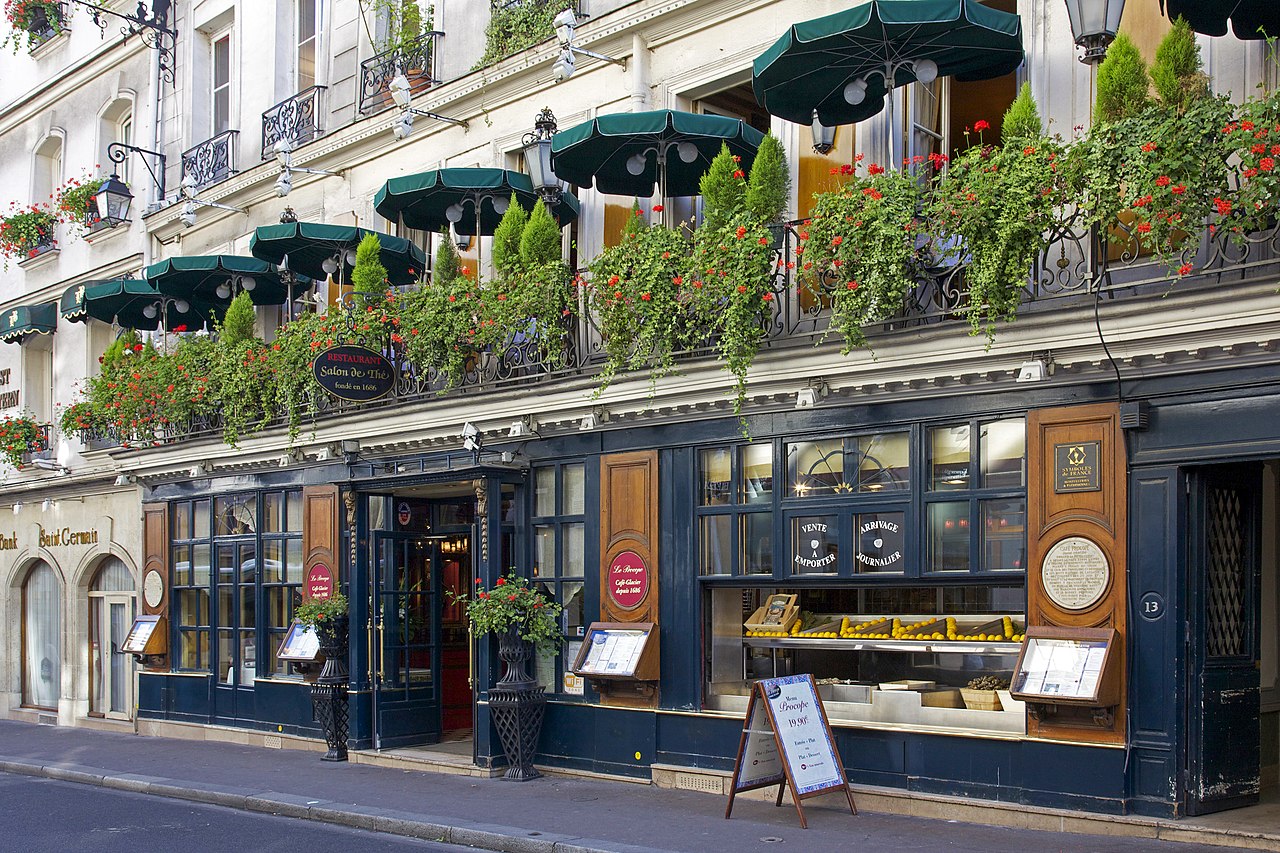Café Procope is the oldest café in Paris. It was established in 1686. Photo by Jean-Marie Hullot / CC BY-SA 2.0 DEED.
French coffee culture is as rich and diverse as the country itself. It’s not just about the beverage; it’s a lifestyle, a social event, a moment of relaxation, and an integral part of French identity.
In France, the café is a staple of daily life. It’s not just a place to grab a quick espresso; it’s a meeting place, a hub of social activity, and a sanctuary to enjoy the simple pleasures of life. Whether it’s a bustling Parisian café or a quaint establishment in a small village, the French café is a symbol of the country’s love for leisure and conversation.
Historical Context
The history of coffee culture in France can be traced back to the 17th century. The first true Parisian coffeehouse, the iconic Café Procope, was established in 1686. Prior to this, coffee was sold from street carts rather than in establishments where you could sit down and take your time. After a brief closure in 1872, it was reopened in the 1920s as a café called Au Grand Soleil, and then later renamed Café Procope. It’s most commonly referred to as Le Procope today.
Café Procope wasn’t just the first shop to sell coffee that wasn’t from a cart on the street, it was also the first authentic adaptation of the “oriental coffee house”. It quickly developed a reputation for being the meeting spot for intellectuals and coteries of distinguished people. This café’s rich backstory represents an enormous part of the socio-cultural history of café culture in Paris.
In a time where who frequented an establishment was a determining factor in success, an esteemed clientele was the mark of a good café. Café Procope did not have a shortage of influential customers. Rousseau, Denis Diderot and Voltaire are just a few of the great figures who frequented the café and heightened its image, making it a cultural and political hotspot.
French cafés were the epicenter of the Enlightenment and cultural revolutions of the 17th and 18th centuries, bastions of counterculture and artistic freedom. As the country was thrown into turmoil and eventual revolution, cafés remained sacred spaces for the sharing of ideas and dissemination of knowledge.

Today, another revolution — of the digital variety — poses a threat to this iconic culture. Café culture throughout France is in decline. Many shops have closed in the past two decades. Several factors likely contribute to this, but the main drivers are probably the rise of the digital age and the rather slow adoption of a worldwide trend toward higher quality artisanal brands.
The Coffee
The French favor the harsh and often bitter Robusta coffee bean, which goes back to colonial days when the beans were imported to France duty-free. They continue to dominate the marketplace today, thanks to a few large companies.
French coffee is typically strong and served in small quantities. The most common type of coffee you’ll find is the café, which is a shot of espresso. There’s also the café allongé, which is an espresso with extra hot water, similar to an Americano. For those who prefer a milder coffee, there’s the café au lait, which is coffee with hot milk, served in a larger cup.
Coffee Etiquette
In France, coffee is usually enjoyed slowly, sipped from small cups while engaging in conversation or people-watching. It’s common to see people spending hours at a café with just a single cup of coffee. It’s not about the quantity, but the quality of the experience.
Final Thoughts
French coffee culture is a reflection of the French way of life — unhurried, sophisticated, and centered around enjoyment and social connection. The French coffee culture teaches us the art of slowing down and savoring the moment. It’s not just about the coffee, but the experience that comes with it. The French café is a social hub, a place for conversation, relaxation, and enjoyment of life’s simple pleasures. It encourages us to take a break from our fast-paced lives and appreciate the beauty of the present moment. The emphasis on quality over quantity, the value of social connection, and the appreciation for the finer things in life are all lessons we can take away from the French coffee culture. So, the next time you have a cup of coffee, remember to take a moment to enjoy it, just like the French do.
Source
Le Procope
Procope.com
*The views and opinions expressed on this website are solely those of the original authors and contributors. These views and opinions do not necessarily represent those of Spotter Up Magazine, the administrative staff, and/or any/all contributors to this site.
